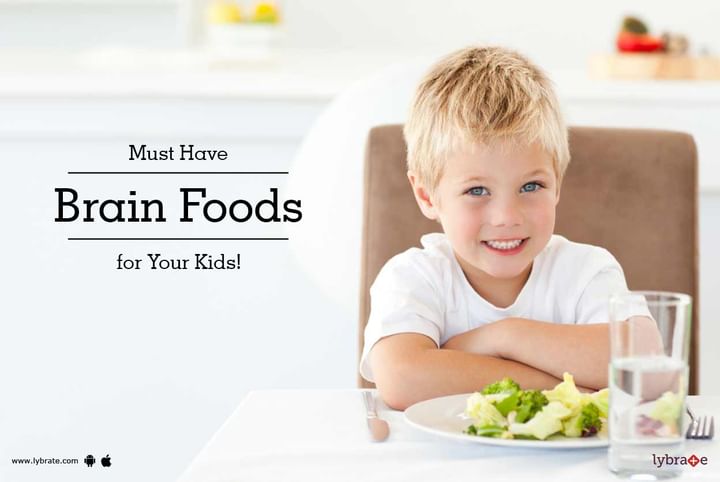Must Have Brain Foods for Your Kids!
Early childhood is a time when the brain develops rapidly and nutrition is an important part of healthy brain development. It is important for children to eat a variety of foods that can provide them with the proper intake of carbohydrate, protein, good fats, minerals, vitamins and antioxidants. There is a very strong mind-gut connection; therefore focusing on the food you choose to complete the nutritional needs of your child can make a great difference in their brain function.
Certain foods are better for our brains than others, these brain foods may help boost a child's brain growth and even improve the memory and cognitive development.
During infancy, the amino acids and fatty acids in breast milk are ideal for optimal brain development. The brain continues to grow throughout early childhood and children who do no consume a balanced diet are at risk of developing mental retardation and behavioral problem.
10 brain foods to feed the mind and body properly:
1. Whole grains: Brain needs a consistent supply of glucose, thus foods those are high in refined sugars and carbohydrates leads to rapid fluctuation in blood glucose levels and the brain doesn't get the steady fuel supply and energy for proper functioning, therefore to nourish the most active part of body include whole-grain breads, oatmeal, roasted grains in the diet of children for regular release of glucose in body. Oats are also rich in vitamin-B, Vitamin-E, potassium and zinc.
2. Eggs: The protein and nutrients in eggs help kids concentrate because the egg yolks are packed with choline which boosts memory. Eggs are also rich in protein, which provides energy to help the brain stay alert longer.
3. Fish: Fish is a good source of vitamin D and omega-3s, which protect the brain from declining mental skills and memory loss. Salmon, tuna, and sardines are all rich in Omega-3s. The more Omega-3s we can get to the brain, the better it will function and the better kids will be able to focus.
4. Seeds: Packed with protein, essential fatty acids, vitamins and minerals. Seeds may boost mood and keep your nervous system in check. For example sunflower seed butter as they are rich in folate, vitamin E and selenium and are safe for nut-free zones.try to include seeds directly to the meals.
5. Iron is important for brain development: Preschoolers and toddlers typically eat less iron-rich foods than they did in infancy. In addition, the iron that children get is usually non-Heme iron (from plant sources,) which has lower availability than heme iron (from animal source).sources beef, nuts and dark leafy vegetable (spinach) and tofu.
6. Milk and Yoghurt: Milk and yoghurt contains healthy fats and proteins those are important for brain health. The majority of the brain is made up of fat, so it is no wonder healthy fat is important to feed the developing brain. Protein is important as it can help brain cells send and receive information effectively. Yoghurt also contains good bacteria that will help boost your child's immune system as well as aid digestion, children need higher dose of vitamin D, which is present in dairy and its products.
7. Organic Foods and leafy vegetables: These organic foods are free from pesticides and insecticides and preservatives and do not cause neurodevelopment problems in children, which will impair proper brain functioning. Green leafy vegetables are loaded with vitamin A and K; these keep inflammation at bay .e.g. Spinach, kale, lettuce.
8. Walnuts: The high level of antioxidants, vitamin and minerals in walnuts improves the cognitive health of kids and improve their mental alertness also.
9. Colorful veggies: Vegetables with a rich, deep color such as tomatoes, sweet potatoes, pumpkin, carrots, and spinach are the best sources of antioxidants that support brain health and keep brain cells strong. These foods can be given from weaning age.
10. Berries: The color of the food tells the nutritional value of it. All the berries like strawberry, cherries, blueberries and blackberries have intense color are especially rich in vitamin C and high levels of antioxidants. Blueberries have high levels of Gallic acid, which boost memory by preventing degeneration of brain cells.
So, go ahead and try to include different food group to your Child's plate for a better performance.



+1.svg)
